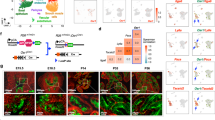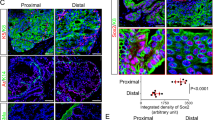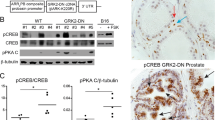Abstract
Background:
Elevated insulin-like growth factor-I (IGF-I) serum levels and phosphatase and tensin homolog (PTEN) loss are prostate cancer (PCa) risk factors that enhance androgen-responsive and castration-resistant PCa xenografts growth.
Methods:
The impact of suppressed growth hormone (GH)/IGF-I levels on neoplastic initiation of PTEN-deficient prostate epithelia was assessed histologically and by epithelial-to-mesenchymal marker expression in Ghrhr D60G homozygous (lit/lit) and heterozygous (lit/+) pbARR2-Cre, PTEN(fl/fl) (PTEN−/−) mice. How suppressed GH/IGF-I levels impacted growth of PTEN−/− mouse-derived prostate cells (MPPK) was examined by growth and survival signaling of cells cultured in lit/+ or lit/lit serum.
Results:
Body weight, prostate weight and serum GH and IGF-I levels were reduced in lit/lit relative to lit/+ PTEN−/− littermates. While the anterior lobes of lit/+ PTEN−/− prostates consistently presented swollen, indicative of ductal blockage, the degree of prostatic dysplasia in 15- and 20-week-old lit/lit and lit/+ PTEN−/− mice was indistinguishable as measured by normalized prostatic weight, tissue histology, or probasin, PSP94, E-cadherin, N-cadherin and vimentin expression. However, growth and AKT activation of MPPK cells was decreased when cultured in lit/lit serum as compared with lit/+ serum and restored in lit/lit serum supplemented with IGF-I and, to a lesser extent, GH.
Conclusions:
These results suggest that initiation of prostate carcinogenesis by loss of PTEN is not influenced by germline variation of genes encoding signaling molecules in the GH/IGF-I axis, but suggests that these factors may affect the progression of dysplastic phenotype and supports previous studies, indicating that the GH/IGF milieu does impact the growth of PTEN-deficient dysplastic prostatic cells once transformed.
This is a preview of subscription content, access via your institution
Access options
Subscribe to this journal
Receive 4 print issues and online access
$259.00 per year
only $64.75 per issue
Buy this article
- Purchase on Springer Link
- Instant access to full article PDF
Prices may be subject to local taxes which are calculated during checkout





Similar content being viewed by others
References
Chan JM, Stampfer MJ, Giovannucci E, Gann PH, Ma J, Wilkinson P et al. Plasma insulin-like growth factor-I and prostate cancer risk: a prospective study. Science 1998; 279: 563–566.
LeRoith D, Roberts CT Jr . The insulin-like growth factor system and cancer. Cancer Lett 2003; 195: 127–137.
Papatsoris AG, Karamouzis MV, Papavassiliou AG . Novel insights into the implication of the IGF-1 network in prostate cancer. Trends Mol Med 2005; 11: 52–55.
Ryan CJ, Haqq CM, Simko J, Nonaka DF, Chan JM, Weinberg V et al. Expression of insulin-like growth factor-1 receptor in local and metastatic prostate cancer. Urol Oncol 2007; 25: 134–140.
Pollak M . Insulin-like growth factor physiology and cancer risk. Eur J Cancer 2000; 36: 1224–1228.
DiGiovanni J, Kiguchi K, Frijhoff A, Wilker E, Bol DK, Beltran L et al. Deregulated expression of insulin-like growth factor 1 in prostate epithelium leads to neoplasia in transgenic mice. Proc Natl Acad Sci USA 2000; 97: 3455–3460.
Chan JM, Stampfer MJ, Ma J, Gann P, Gaziano JM, Pollak M et al. Insulin-like growth factor-I (IGF-I) and IGF binding protein-3 as predictors of advanced-stage prostate cancer. J Natl Cancer Inst 2002; 94: 1099–1106.
Grimberg A . Mechanisms by which IGF-I may promote cancer. Cancer Biol Ther 2003; 2: 630–635.
Hellawell GO, Turner GD, Davies DR, Poulsom R, Brewster SF, Macaulay VM . Expression of the type 1 insulin-like growth factor receptor is up-regulated in primary prostate cancer and commonly persists in metastatic disease. Cancer Res 2002; 62: 2942–2950.
Scorilas A, Plebani M, Mazza S, Basso D, Soosaipillai AR, Katsaros N et al. Serum human glandular kallikrein (hK2) and insulin-like growth factor 1 (IGF-1) improve the discrimination between prostate cancer and benign prostatic hyperplasia in combination with total and %free PSA. Prostate 2003; 54: 220–229.
Oliver SE, Barrass B, Gunnell DJ, Donovan JL, Peters TJ, Persad RA et al. Serum insulin-like growth factor-I is positively associated with serum prostate-specific antigen in middle-aged men without evidence of prostate cancer. Cancer Epidemiol Biomarkers Prev 2004; 13: 163–165.
Frasca F, Pandini G, Sciacca L, Pezzino V, Squatrito S, Belfiore A et al. The role of insulin receptors and IGF-I receptors in cancer and other diseases. Arch Physiol Biochem 2008; 114: 23–37.
Hellawell GO, Ferguson DJ, Brewster SF, Macaulay VM . Chemosensitization of human prostate cancer using antisense agents targeting the type 1 insulin-like growth factor receptor. BJU Int 2003; 91: 271–277.
Krueckl SL, Sikes RA, Edlund NM, Bell RH, Hurtado-Coll A, Fazli L et al. Increased insulin-like growth factor I receptor expression and signaling are components of androgen-independent progression in a lineage-derived prostate cancer progression model. Cancer Res 2004; 64: 8620–8629.
Nickerson T, Chang F, Lorimer D, Smeekens SP, Sawyers CL, Pollak M . In vivo progression of LAPC-9 and LNCaP prostate cancer models to androgen independence is associated with increased expression of insulin-like growth factor I (IGF-I) and IGF-I receptor (IGF-IR). Cancer Res 2001; 61: 6276–6280.
Huynh H, Seyam RM, Brock GB . Reduction of ventral prostate weight by finasteride is associated with suppression of insulin-like growth factor I (IGF-I) and IGF-I receptor genes and with an increase in IGF binding protein 3. Cancer Res 1998; 58: 215–218.
Pandini G, Mineo R, Frasca F, Roberts CT Jr, Marcelli M, Vigneri R et al. Androgens up-regulate the insulin-like growth factor-I receptor in prostate cancer cells. Cancer Res 2005; 65: 1849–1857.
Ohlsson C, Mohan S, Sjogren K, Tivesten A, Isgaard J, Isaksson O et al. The role of liver-derived insulin-like growth factor-I. Endocr Rev 2009; 30: 494–535.
Butler AA, Yakar S, Gewolb IH, Karas M, Okubo Y, LeRoith D . Insulin-like growth factor-I receptor signal transduction: at the interface between physiology and cell biology. Comp Biochem Physiol B 1998; 121: 19–26.
Thomas GV, Horvath S, Smith BL, Crosby K, Lebel LA, Schrage M et al. Antibody-based profiling of the phosphoinositide 3-kinase pathway in clinical prostate cancer. Clin Cancer Res 2004; 10: 8351–8356.
Muller M, Rink K, Krause H, Miller K . PTEN/MMAC1 mutations in prostate cancer. Prostate Cancer Prostatic Dis 2000; 3 (Suppl 1): S32.
Trotman LC, Niki M, Dotan ZA, Koutcher JA, Di Cristofano A, Xiao A et al. Pten dose dictates cancer progression in the prostate. PLoS Biol 2003; 1: 27.
Takahara K, Tearle H, Ghaffari M, Gleave ME, Pollak M, Cox ME . Human prostate cancer xenografts in lit/lit mice exhibit reduced growth and androgen-independent progression. Prostate 2011; 71: 525–537.
Whang YE, Wu X, Suzuki H, Reiter RE, Tran C, Vessella RL et al. Inactivation of the tumor suppressor PTEN/MMAC1 in advanced human prostate cancer through loss of expression. Proc Natl Acad Sci USA 1998; 95: 5246–5250.
Yoshimoto M, Joshua AM, Cunha IW, Coudry RA, Fonseca FP, Ludkovski O et al. Absence of TMPRSS2:ERG fusions and PTEN losses in prostate cancer is associated with a favorable outcome. Mod Pathol 2008; 21: 1451–1460.
Wang S, Gao J, Lei Q, Rozengurt N, Pritchard C, Jiao J et al. Prostate-specific deletion of the murine Pten tumor suppressor gene leads to metastatic prostate cancer. Cancer Cell 2003; 4: 209–221.
Mulholland DJ, Tran LM, Li Y, Cai H, Morim A, Wang S et al. Cell autonomous role of PTEN in regulating castration-resistant prostate cancer growth. Cancer Cell 2011; 19: 792–804.
Suzuki A, Yamaguchi MT, Ohteki T, Sasaki T, Kaisho T, Kimura Y et al. T cell-specific loss of Pten leads to defects in central and peripheral tolerance. Immunity 2001; 14: 523–534.
Wu X, Wu J, Huang J, Powell WC, Zhang J, Matusik RJ et al. Generation of a prostate epithelial cell-specific Cre transgenic mouse model for tissue-specific gene ablation. Mech Dev 2001; 101: 61–69.
Godfrey P, Rahal JO, Beamer WG, Copeland NG, Jenkins NA, Mayo KE . GHRH receptor of little mice contains a missense mutation in the extracellular domain that disrupts receptor function. Nat Genet 1993; 4: 227–232.
Moussavi M, Fazli L, Tearle H, Guo Y, Cox M, Bell J et al. Oncolysis of prostate cancers induced by vesicular stomatitis virus in PTEN knockout mice. Cancer Res 2010; 70: 1367–1376.
Luchman HA, Benediktsson H, Villemaire ML, Peterson AC, Jirik FR . The pace of prostatic intraepithelial neoplasia development is determined by the timing of Pten tumor suppressor gene excision. PLoS One 2008; 3: 15.
Mulholland DJ, Kobayashi N, Ruscetti M, Zhi A, Tran LM, Huang J et al. Pten loss and RAS/MAPK activation cooperate to promote EMT and metastasis initiated from prostate cancer stem/progenitor cells. Cancer Res 2012; 72: 1878–1889.
Majeed N, Blouin MJ, Kaplan-Lefko PJ, Barry-Shaw J, Greenberg NM, Gaudreau P et al. A germ line mutation that delays prostate cancer progression and prolongs survival in a murine prostate cancer model. Oncogene 2005; 24: 4736–4740.
Furukawa J, Wraight CJ, Freier SM, Peralta E, Atley LM, Monia BP et al. Antisense oligonucleotide targeting of insulin-like growth factor-1 receptor (IGF-1R) in prostate cancer. Prostate 2010; 70: 206–218.
Anzo M, Cobb LJ, Hwang DL, Mehta H, Said JW, Yakar S et al. Targeted deletion of hepatic Igf1 in TRAMP mice leads to dramatic alterations in the circulating insulin-like growth factor axis but does not reduce tumor progression. Cancer Res 2008; 68: 3342–3349.
Szabolcs M, Keniry M, Simpson L, Reid LJ, Koujak S, Schiff SC et al. Irs2 inactivation suppresses tumor progression in Pten+/− mice. Am J Pathol 2009; 174: 276–286.
Schally AV, Varga JL . Antagonists of growth hormone-releasing hormone in oncology. Comb Chem High Throughput Screen 2006; 9: 163–170.
Stangelberger A, Schally AV, Varga JL, Hammann BD, Groot K, Halmos G et al. Antagonists of growth hormone releasing hormone (GHRH) and of bombesin/gastrin releasing peptide (BN/GRP) suppress the expression of VEGF, bFGF, and receptors of the EGF/HER family in PC-3 and DU-145 human androgen-independent prostate cancers. Prostate 2005; 64: 303–315.
Kong D, Banerjee S, Ahmad A, Li Y, Wang Z, Sethi S et al. Epithelial to mesenchymal transition is mechanistically linked with stem cell signatures in prostate cancer cells. PLoS One 2010; 5: e12445.
van der Pluijm G . Epithelial plasticity, cancer stem cells and bone metastasis formation. Bone 2011; 48: 37–43.
Acknowledgements
We thank Virginia Yago, Darrell Trendall, Estelle Li and Mary Bowden for their excellent technical assistance. This work was supported by Terry Fox Program in Prostate Cancer Progression grant from the National Cancer Institute of Canada (no. 017007) and a CIHR Doctoral Fellowship award (to MG).
Author information
Authors and Affiliations
Corresponding author
Ethics declarations
Competing interests
The authors declare no conflict of interest.
Additional information
Supplementary Information accompanies the paper on the Prostate Cancer and Prostatic Diseases website
Supplementary information
Rights and permissions
About this article
Cite this article
Takahara, K., Ibuki, N., Ghaffari, M. et al. The influence of growth hormone/insulin-like growth factor deficiency on prostatic dysplasia in pbARR2-Cre, PTEN knockout mice. Prostate Cancer Prostatic Dis 16, 239–247 (2013). https://doi.org/10.1038/pcan.2013.14
Received:
Revised:
Accepted:
Published:
Issue Date:
DOI: https://doi.org/10.1038/pcan.2013.14
Keywords
This article is cited by
-
Exogenous administration of protease-resistant, non-matrix-binding IGFBP-2 inhibits tumour growth in a murine model of breast cancer
British Journal of Cancer (2014)



